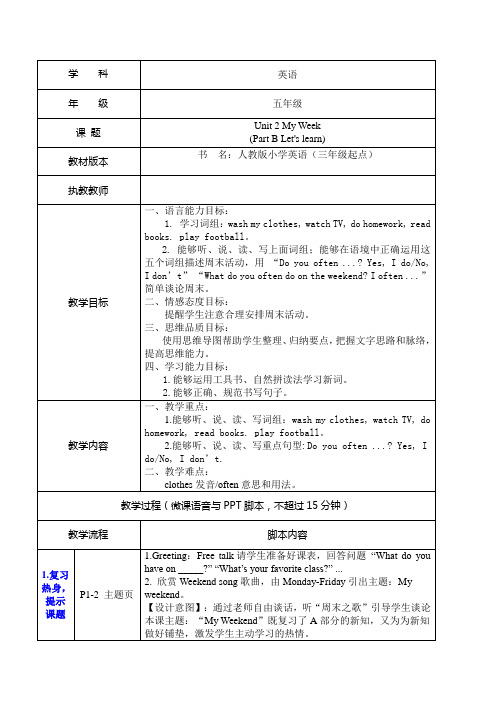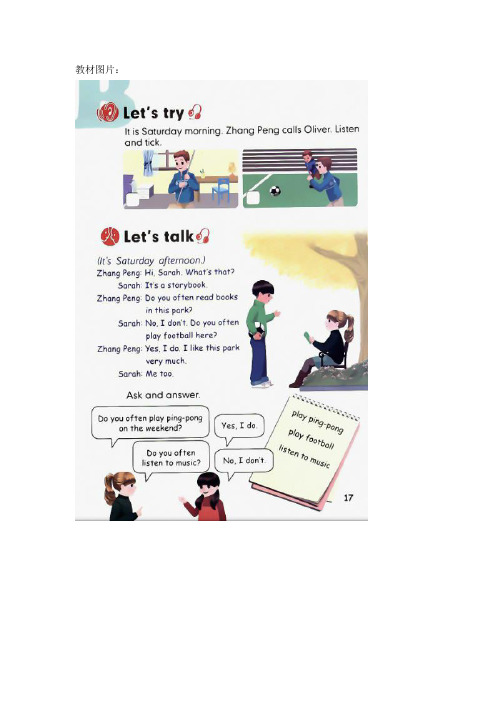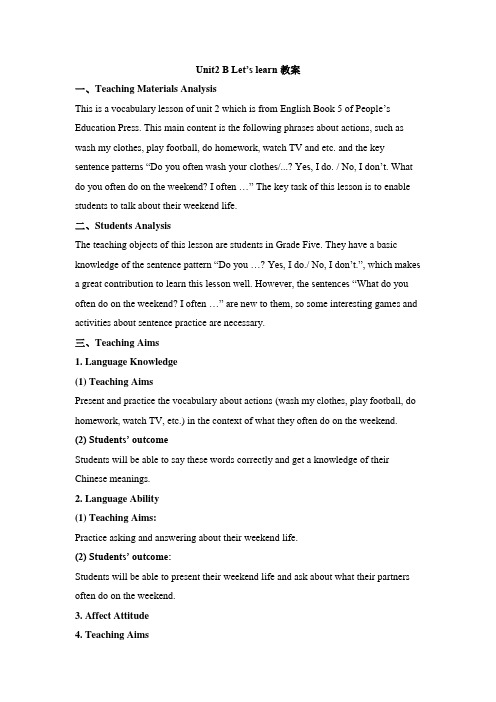人教版(PEP)五年级英语上册Unit2 My week B let's learn课件
- 格式:ppt
- 大小:9.30 MB
- 文档页数:23


Unit2 My Week Part B Let’s Learn (教案)一、教学目标1.掌握周的单词和问答方式。
2.学会使用时间表进行周视觉表达。
3.了解周的各种时间表达方式。
二、教学重点1.练习周的单词和问答方式。
2.学会使用时间表进行周视觉表达。
三、教学难点1.听懂各种时间的表达方式。
2.使用时间表进行周视觉表达。
四、教学过程1. 导入新课1.向学生介绍本节课学习的内容:我们将学习周的各种时间表达方式。
2. 学习新词汇1.下午、晚上、夜在周内的位置:用屏幕展示一张周时间表,向学生展示下午、晚上、夜在周内的位置。
2.学习新词汇:下午(afternoon)、晚上(evening)、夜(night),请学生跟读几遍。
3.向学生展示图片,请学生说出该图片在周内的时间:下午、晚上、夜。
3. 听力训练1.提醒学生注意听,听描述后回答问题。
2.播放音频,听第一段描述,请学生回答这是什么时候。
3.播放音频,听第二段描述,请学生回答这是什么时候。
4.播放音频,听第三段描述,请学生回答这是什么时候。
4. 视觉表达1.展示时间表格,向学生解释如何读取和使用时间表格。
2.每位学生根据自己的安排填写一张个人时间表,展示出来。
3.请几位学生介绍自己的时间表,其他学生可以加以评论和提问。
5. 延伸练习1.配对练习:向学生展示两张时间表格,请学生在两张时间表格之间配对正确的时间。
2.完成任务:用音频描述一段时间内的活动,学生需要根据描述在时间表格中标注正确的时间。
3.听读练习:播放音频,学生跟读每个时间,加强记忆。
五、课堂小结1.通过本节课的学习,学生掌握了周的各种时间表达方式,并学会使用时间表进行周视觉表达。
2.学生在个人时间表的填写过程中,表现出了一定的时间规划能力。
六、作业布置1.让学生完成配对练习和完成任务。
2.要求学生每天写一个时间日记,体验更好的时间管理。
七、教学反思1.整堂课以听说为主,没有开展大量的读写活动,下节课要加强对其的训练。


PEP人教版小学英语五年级上册Unit2 My week B Let's learn教学设计及反思P PEP 五上 Unit 2 B Let n s learn 优课教学设计课题:P PEP 五上 Unit 2 B Let s learn 教教材:人教版课课型:词汇课年年级:五年级上课时长: 40 分分钟一、教学内容:二、教学目标通过本课时的学习,学生能够通过已有的 phonics 知识和老师、图片、录音的帮助下,听、说、读、写五个动词词组:wash my clothes, watch TV, do homework, read books, play football, 能够在语境中正确运用这五个词组描述周末活动,以及培养合理安排周末活动的意识。
三、教学重难点重点:学生能够通过已有的 phonics 知识和老师、图片、录音的帮助下,听、说、读、写五个动词词组:wash my clothes, watch TV, do homework, read books, play football。
难点:能够在语境中正确运用这五个词组描述周末活动,以及培养合理安排周末活动的意识。
四、学情分析本课时与学生的日常生活安排息息相关。
五年级三班的学生生性活泼,思维方式以直观思维向逻辑思维发展中,乐于与他人交流自己的观点与看法。
在过去四年的英语学习中,学生已经学习过如 read a book,clean the classroom 等表示动作的词组,能听懂老师的指令,能在图片或者多媒体的帮助下听懂、读准单词和句子,并能运用 phonics 拼读出英语单词。
五、教学内容分析:《小学英语课程标准》要求学生能够进行关于学校课程安排和周末活动的交流对话。
本单元的学习主题是学校课程安排和周末活动,主要是周一到周日和业余活动的词汇词组学习,及运用 What do you have?或 What do you often do ? 和 Do you often?在 A 部分 Lets talk 中,学生已经学过周一到周日的词汇,以及 What do you have/ do? I have on.的句型,B 部分 Lets talk 中,学生也学会了用 Do you ? 句型来询问他人的日常活动。

教材图片:Unit2 Part B Let’s talk教材:人教PEP小学英语五年级上册P17单元主题:My week课型:听说课一、教材解析本课时是五年级上册Unit2的第四课时,包含B Let’s try及B Let’s talk。
B Let’s try 是针对B Let’s talk板块的新句型Do you often ...? Yes, we do./No, we don’t.而设计的听力活动。
旨在使学生能够借助图片听懂简短对话,抓住关键信息,提高听的能力。
Let’s talk通过张鹏和Sarah周末在公园里的对话,使学生感知句型Do you often read books/..? Yes, we do./No, we don’t.的语义和语用情景。
二、目标预设1. 能够完成听录音选图片的活动。
2. 能够在图片和教师的帮助下理解对话的大意;能够按照正确的意群及语音、语调朗读并表演对话。
3. 能够在情景中运用句型Do you often read books/..? Yes, we do./No, we don’t.询问对方经常从事的周末活动并作答;能够在语境中理解词组read books, play football的意义并能正确发音。
三、重难点预设教学重点:理解并能朗读对话;在情景中运用句型Do you often read books/..? Yes, we do./No, we don’t.进行问答。
教学难点:在情景中运用句型Do you often read books/..? Yes, we do./No, we don’t.进行问答。
四、教学过程(一)热身(Warm-up)1. 师生相互问候,练习课堂口语。
2. 教师播放本单元歌曲Days of the week,学生跟唱,进行课堂热身。
3. 师生自由谈话,复习A部分所学重点句型:What do you have onMondays/Tuesdays/…?学生回答后,教师询问学生周末都有什么课?或者教师先说:我周末没有课,你们呢?周末是否有课?了解学生的周末安排。

Unit2 B Let’s learn教案一、Teaching Materials AnalysisThis is a vocabulary lesson of unit 2 which is from English Book 5 of People’s Education Press. This main content is the following phrases about actions, such as wash my clothes, play football, do homework, watch TV and etc. and the key sentence patterns “Do you often wash your clothes/...? Yes, I do. / No, I don’t. What do you often do on the weekend? I often …” The key task of this lesson is to enable students to talk about their weekend life.二、Students AnalysisThe teaching objects of this lesson are students in Grade Five. They have a basic knowledge of the sentence patte rn “Do you…? Yes, I do./ No, I don’t.”, which makes a great contribution to learn this lesson well. However, the sentences “What do you often do on the weekend? I often …” are new to them, so some interesting games and activities about sentence practice are necessary.三、Teaching Aims1. Language Knowledge(1) Teaching AimsPresent and practice the vocabulary about actions (wash my clothes, play football, do homework, watch TV, etc.) in the context of what they often do on the weekend. (2) Students’ outcomeStudents will be able to say these words correctly and get a knowledge of their Chinese meanings.2. Language Ability(1) Teaching Aims:Practice asking and answering about their weekend life.(2) Students’ outcome:Students will be able to present their weekend life and ask about what their partners often do on the weekend.3. Affect Attitude4. Teaching AimsEncourage students to arrange their weekend life reasonably and try to enrich their weekend life.(1) Students’ outcomeStudents will have the awareness of “A ll work and no play makes Jack a dull boy”.5. Learning Strategy:(1) Teaching Aims:Encourage students to cooperate with their partners to complete the learning task. (2) Students’ outcome:Students will have the awareness of cooperating with partners to complete the learning task.四、Teaching Key Points and Difficult Points1. Teaching Key PointsHave a good command of some vocabulary and sentence patterns about actions: wash my clothes, play football, do homework, watch TV and etc. “Do you often wash your clothes/...? Yes, I do. / No, I don’t. What do you often do on the weekend? I often …”2. Teaching Difficult PointsBe able to have a good communication with others about their weekend life with the learnt knowledge.五、Teaching AidsMulti-media; a tape-recorder; pictures; chalkboard, etc.六、教学过程Step 1 Warm-up (2 mins)T-SsSing the song “My week” after the tape.Intensions: Review the vocabulary about days in a relaxing atmosphere, which arouses their enthusiasm.Step 2 Lead-in (4 mins)T-SsS-SsAnswer the questions:Q1: How many days are there in a week?Q2: What are they?Q3: Which day do you like best? Why?Intensions: Guide students to express their own ideas through questions of different levels.Step 3 Presentation (16 mins)T-SsS-SsS-S1. Present the vocabulary with my video about my weekend lifeA: Watch the video and answer the questions.B: Read the vocabulary after the tape.Game TimeA: Let’s dance (Look at the phrases and do the actions)B: Look and say (Look at the actions/pictures and say the phrases)Intensions: Watching my video and guessing will arouse students’ curiosity. The challenge time can stimulate students’ interest in practicing the pronunciation of these words. Guide to watch TV in a correct way and cultivate them the awareness of helping at home.Step 4 Production (15 mins)T-SsS-Ss1. Pair work: Talk about their weekend.A: What do you often do on the weekend?B: I often …2. Group work: Work in groups of four and design a colourful weekend. Then choosea reporter to report.Intensions: Group work will help students learn to cooperate with others to complete the learning task and motivate their enthusiasm in the participation in consolidating the new words and sentence patterns. The mind-map will help students to arrangetheir weekend reasonably.Step 5 Summary (2 mins)T-SsMake a summary of the new words and the sentence pattern by raising questions. Step 6 Homework (1 min)T-SsRead after the tape.Design your dream weekend and write them down.Unit Two My weekPep五上Unit2 My week A let’s learn教学设计。
PEP Book 5 Unit2 My week Part(B) Let’s talk教学目标与要求1.能听、说、认读单词“often”和“park”。
2.能听懂、会说句子“Do you o ften read books in this park?”,“I like this park very much.”,“Me too.”。
3.能完成“Let’s try”部分的听力任务。
4.感知英语在日常生活中的实用性,鼓励学生学习有用的英语。
重点能听懂、会说句子“Do you often read b ooks in this park?”,“I like this park very much.”,“Me too.”。
难点能灵活运用句型“Do you often …?”询问他人的日常活动并作出相应的回答。
教具单词卡片、图片、课件教学环节师生活动Preparation准备活动1.Let’s chant: Days of the week.2.Free talkT: Hello, everyone. Nice to meet you.Ss: Nice to see you, too.T: How are you today?Ss: Very well, thank you.T: S1, what do you often do on the weekend?S1: I often …T: S2, what do you often do on the weekend?S2: I often …3.交流What do you do on Saturdays/Sundays/the weekend?I often……(设计意图:激活学生原有旧知,调动他们参与新课堂的积极性)教学环节师生活动Presentation新知呈现Let’s try(1) 明确听力任务(2) 第一次播放教学录音,学生根据录音内容完成练习。
Unit 2My weekPart B Let’s learn & Group work教材分析本单元的主题是有关学校课程安排和周末活动。
本节课是本单元的第五课时,是一节词汇课。
学生在本单元的前几课时已经学习了如何讨论日常活动安排。
本课中学生继续学习有关周末活动的词组,丰富语言表达。
教材通过两人讨论周末活动的对话情景,呈现五个词组的词形和意义。
教学目标1.能听、说、读、写有关周末活动的词组:wash my clothes、watch TV、do homework、read books、play football;2.能在语境中正确运用上述五个词组描述周末活动,灵活运用本课知识;3.能在句子中正确使用连词and;4.能够积极参与课堂活动,掌握本课主要语言的基本框架,并乐于思考与交流。
教学重点1.能听、说、读、写有关周末活动的词组:wash my clothes、watch TV、do homework、read books、play football;2.能在语境中正确运用上述五个词组描述周末活动,灵活运用本课知识。
教学难点能在句子中正确使用连词and,如:“I often do homework, watch TV and draw pictures on the weekend.”。
教学准备1.课件、教材音频;2.wash my clothes、watch TV、do homework、read books、play football单词卡片。
教学过程Step 1 Lead-inFree talk出示教材中的课程表或自己班级的课程表,师生运用本单元核心句型讨论课程表,巩固所学句型。
1.星期一至星期五的学校课程安排。
S1: What do you have on ________?S2: I have …2.周末的活动安排。
S1: How about your weekend? What do you often do on your weekend?S2: I often draw pictures and play football.通过图片提示,学生复习对话课中学到的词组,将所学知识应用于实际学习和生活中。